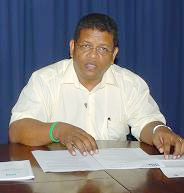

SNP TO RETURN TO NATIONAL ASSEMBLY

The
Ramkalawan said that the boycott of National Assembly proceedings following the assault by police on him and other party supporters on the precinct of the National Assembly on October 3, 2006 was their way of protesting the police actions. The boycott was also a protest at the way the ruling party was curtailing freedom of expression by prohibiting a political organisation or anyone associated with it from obtaining a radio broadcasting licence.
The leader of the Opposition said that the public inquiry by Irish Judge Michael Reilly which opens next week and the National Consultative Committee on Law and Order (on which he also sits with other eminent persons) which is about to issue a first draft report, are very significant steps which have now been taken to tackle these issues long the concerns of his party.
SNP, he said, believes its absence from the Assembly has demonstrated that the contribution of the opposition is essential to the democratic process. The SPPF, he said, conducted no serious business during that time.
The Leader of the Democratic Party,
Mr Chow, said that President James Michel has a major responsibility to ensure that an October 3 incident should never happen again in our country and in this respect he should use the occasion of his State of the Nation address to make a public commitment to implementing without reservation all the recommendations of both the Reilly inquiry and the Law and Order Committee.
Chow said that the Democratic Party considers the Broadcasting and Telecommunications Act 2006 unconstitutional as it encroaches on the Freedom of Expression guaranteed by the Constitution, as well as being a law which discriminates against those who, when, in exercising their Freedom of Association, forms a political party. It is ludicrous that individuals or political parties cannot operate a radio station simply because they are exercising their fundamental right. The Democratic Party, he says, intends to fight to have the law declared unconstitutional as the earliest possible time.